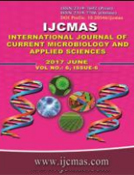


 National Academy of Agricultural Sciences (NAAS)
National Academy of Agricultural Sciences (NAAS)

|
PRINT ISSN : 2319-7692
Online ISSN : 2319-7706 Issues : 12 per year Publisher : Excellent Publishers Email : editorijcmas@gmail.com / submit@ijcmas.com Editor-in-chief: Dr.M.Prakash Index Copernicus ICV 2018: 95.39 NAAS RATING 2020: 5.38 |
Viral diseases cause greatest economic damage to the tomato crop among them Tospovirus belonging to the family of Bunyaviridae causes devastating diseases to many economically important crops including tomato. Many plant species are known to synthesize proteins with antiviral properties. The genes encoding anti viral proteins (AVPs) have been isolated and cloned from many plants. The study was conducted on synthesis of engineered Bougainvillea antiviral gene and its expression in tomato plant. In previous studies in our laboratory full length BAP-cDNA was amplified, cloned and transformed in bacteria and plant. Transformation of this full length BAP-cDNA showed that E. coli cells grew slowly and the callused of tomato tissues turned necrotic after few days. This might be due to the ribosome inactivating (RIP) property of Bougainvillea antiviral protein (BAP). To remove the ribosome inactivating (RIP) activity of BAP, primers were designed for cDNA encoding truncated/engineered Bougainvillea antiviral protein (BAP). This truncated BAP–cDNA was cloned into pGA643 vector and mobilised into Agrobacterium strain EHA105. Agrobacterium transformation was performed using hypocotyls and cotyledon as explants. The T¬¬0 ¬¬putative plant with pGA643 harbouring truncated Bougainvillea antiviral protein confirmed by PCR and seeds were harvested for further analysis.
 |
 |
 |
 |
 |